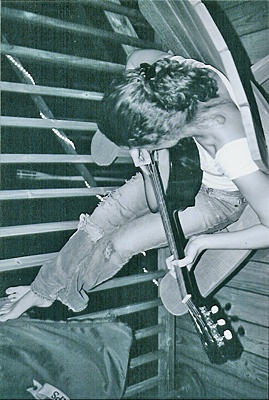All Nonfiction
- Bullying
- Books
- Academic
- Author Interviews
- Celebrity interviews
- College Articles
- College Essays
- Educator of the Year
- Heroes
- Interviews
- Memoir
- Personal Experience
- Sports
- Travel & Culture
All Opinions
- Bullying
- Current Events / Politics
- Discrimination
- Drugs / Alcohol / Smoking
- Entertainment / Celebrities
- Environment
- Love / Relationships
- Movies / Music / TV
- Pop Culture / Trends
- School / College
- Social Issues / Civics
- Spirituality / Religion
- Sports / Hobbies
All Hot Topics
- Bullying
- Community Service
- Environment
- Health
- Letters to the Editor
- Pride & Prejudice
- What Matters
- Back
Summer Guide
- Program Links
- Program Reviews
- Back
College Guide
- College Links
- College Reviews
- College Essays
- College Articles
- Back
Catchy Profanity
Imagine this: You're driving in the car with your mom or dad, with the radio loud and the windows down. A really catchy song comes on that you haven't heard before. You instantly fall in love with it! When you go home, you can't wait to buy the song on iTunes. But just before you hit the 'Buy' button, something catches your eye. It's a little red box next to the title of the song. It says the word 'explicit'. You are shocked that a such a good song could have bad words in it!
This happens every day. Current songs that you hear on the radio in the car may appear to be clean and decent, but in reality, they are offensive and profane. This problem is a common one among today's kids and teens. It is understandable that a parent doesn't want their kid listening to those words, but then again, if they hear those words from other students at their school and their kid already knows that a certain word is said in a song, will it make a difference? Some parents think that if kids and teens listen to music with profanity, they are more likely to say those words, and some think not. But why are these words said in the first place?
Usually, an artist uses profanity or indecent language in his or her song to either go with their image or to help express the overall emotion or attitude of the song. Also, an artist might know that the type of audience that listens to their music might use those words or be mature enough to hear them. That's not always the case, though.
Younger kids and teens might have older brothers or sisters that listen to music with profanity in the songs or they might even say those words in front of their siblings. This most likely makes kids more prone to say those bad words or listen to music with bad words at a younger age.
So, the next time you go to buy a song and you see the dreaded little 'explicit' box, think about if the words are necessary to be heard or not. Is it worth giving up the full version of the song to click the 'Clean' button for the same price?

Similar Articles
JOIN THE DISCUSSION
This article has 1 comment.
